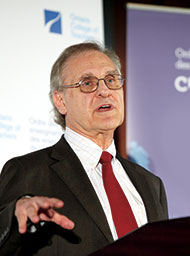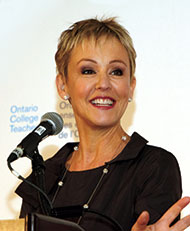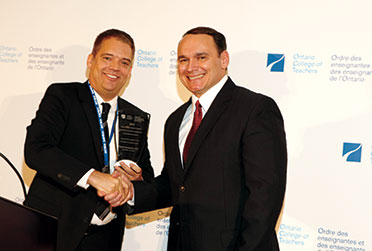
INSPIRING PUBLIC CONFIDENCE CONFERENCE 2012
Catch the highlights of the College’s 2012 conference.
BY HELEN DOLIK
Teacher Jodi Richardson, OCT, seized the opportunity, to attend the Ontario College of Teachers’ Inspiring Public Confidence conference. Leaders from education and the regulatory world discussed trending topics that challenged minds and touched hearts.
“This was one of the best conferences I have ever been to,” says Richardson. “The seminars were engaging and informative. The speakers were knowledgeable in their field and gave great insight on a range of topics. I knew it was the perfect opportunity to learn about the current trends and changes in Ontario education today, with speakers chosen by the body that represents us.”
Richardson had continued her professional growth through Additional Qualification courses, but there were still answers and advice she was seeking. “Stephen Lewis delivered an inspirational speech on human rights, the environment and the power we have as teachers to make a difference — all personal passions of mine having worked in Asia and the Middle East. His speech reminded me why I went into teaching — ‘the power of one.’”
Richardson says she met “incredible individuals” from across Canada with whom she exchanged invaluable information, insight and advice. The College’s conference, November 21–23, 2012, at the Sheraton Centre Toronto Hotel, featured keynote addresses by Lewis, one of Canada’s most influential commentators on social affairs and human rights, and Wendy Mesley, the award-winning television host and reporter.
The conference attracted 235 participants from British Columbia to Newfoundland, and from as far away as Japan and England. There were 24 workshops — 18 in English and six in French. The presenters addressed topics in three streams: professional regulation, acting in the public interest, and effective practices and research in teacher education.
Range of workshops
Popular workshops included The LeSage Report: Recommendations for Efficiency and Transparency in Self-regulation, The Boomer/Echo Boomer Face-Off, And Nobody Came to the Funeral: The Quiet Death of the B.C. College of Teachers (1988–2011) and On Thin Ice: Maintaining Professional Boundaries.
Nana Kodama, an associate professor at Japan’s Shiga University, visited the College last March to gather information about teacher education in multicultural Ontario, and returned for the conference in November. “I have been particularly interested in how the Canadian education system and teachers accept students from culturally diverse backgrounds, because the number of students with foreign backgrounds is rapidly increasing in Japanese schools,” Kodama says. The workshop Diversity, Equity and Inclusion: The Building Blocks of a School that Welcomes All guided her through a “new theory of inclusive education in place of multicultural education.”
Satisfied participants
British teacher Rachel Dubsky flew in from England specifically for the conference to gather research for her doctoral thesis about professional boundaries in student-teacher relationships. “I’m so glad I came; it was worth it,” says Dubsky.
Three Council members — Marie-Louise Chartrand, Mary Lou Mackie, OCT, and Monique Châteauvert — attended the conference. “As a professional, I have had many opportunities to attend such conferences. I have rarely attended one that so well met my expectations,” Châteauvert says. “The choice of speakers and themes, along with the quality of the organization, has made this event one that I will remember fondly as a challenging, thought-provoking opportunity.”
Denis Chartrand, OCT, regional manager at the Ottawa office of the Ontario Ministry of Education, attended workshops in French and English. He says the conference was well run and time was built in for networking. “I must congratulate the Ontario College of Teachers. From the moment I arrived at the registration desk, I was addressed in French. I know it’s very important for them to serve both French and English members. It makes you feel welcome,” says Chartrand, who has worked in education for 37 years, from teacher to director of education.
A first-time College conference attendee, Debra Edwards, Orillia’s trustee with the Simcoe County DSB, felt it was an excellent experience. “I’ve spoken to so many attendees — teachers and administrators. It’s very informative.”
Other regulators
The conference attracted representatives from many regulatory bodies in Ontario and across Canada. “This was an opportunity to get exposure to thoughts and ideas from other professionals about the whole field of regulation,” says Bill Hill, director of regulatory affairs for the Institute of Chartered Accountants of Saskatchewan.
Camille Naranjit, OCT, a teacher with the Hamilton-Wentworth DSB, attended the conference to learn more about the LeSage Report, regulation and effective teaching methods. “I’m strongly motivated to keep current in my teaching practice,” she says. “I came to network and to meet people from other parts of the province.” She’d recommend the conference to other teaching professionals as a way to discover new ideas.
The closing words to a successful conference belonged to Joe Jamieson, OCT, the College’s Deputy Registrar and conference chair: “We hope to see you in 2014.”
Words for change

Respected humanitarian Stephen Lewis delivered a powerful and provocative opening address at the College’s Inspiring Public Confidence conference on November 21 at the Sheraton Centre Toronto Hotel, which captivated the audience of teaching professionals, regulators and the public. Lewis, a former diplomat, spoke eloquently and passionately about the importance of schools for children, the value of the teaching profession, the struggle for gender equality, poverty and climate change.
Exceptional background
Lewis is a Distinguished Visiting Professor at Ryerson University in Toronto. He serves as the board chair of the Stephen Lewis Foundation in Canada, which is dedicated to turning the tide of HIV/AIDS in Africa. He was Canada’s Ambassador to the United Nations and the UN Special Envoy for HIV/AIDS in Africa.
In the 1990s, Lewis co-ordinated a study examining the consequences of armed conflict on children. “Whether a child was in conflict or coming out of conflict, what a child most wanted was a school,” he says. “It was so fascinating. Everywhere we went, from Cambodia to Rwanda, to Colombia, to the Balkans, that’s what kids talked about. When you asked them directly what did they want in the midst of the carnage all around them, they would say ‘we want to go to school.’”
He talked about the force and value of education and what school means to children. “It’s not just the love of learning, it’s the sense of solidarity with other kids.”
Advice for the College
During his address, Lewis encouraged the College to increase its profile and to add its voice to the panorama of voices speaking out. “It would do wonders for the Ontario College of Teachers to have a voice which is much respected and to develop a profile — to be controversial in the best way, not antagonistic, not as I am. Just gentle and persuasive.”
In closing, Lewis offered these words about the value of teaching. “I can’t imagine a more noble activity than to be engaged in teaching and education,” he says. “After all, it is the lifeblood of a society.”
A message that resonated
Praise abounded for Lewis’s address.“He was unabashedly honest, incredibly eloquent, highly respectful and completely accessible — what I would call inspiring,” says Michelle Cader, OCT, an educator who produces online educational resources. “He drew on his vast life experience to share stories he knew educators could and would respond to.
“Ultimately, he urged us to focus on educating ourselves and our students about the issues he defined as the most pressing of the day — gender equality, poverty and climate change. It was a real call to action.”
A matter of trust

Award-winning TV host and reporter Wendy Mesley elegantly wove the issue of trust throughout her closing keynote address at the Ontario College of Teachers’ Inspiring Public Confidence conference. Teachers, regulators and journalists are in a special and privileged position, she told the audience at the Sheraton Centre Toronto Hotel on November 23. “We have, conditionally, been given the people’s trust to be ethical, to be professional and to be worthy of the public’s confidence. We have standards. We have regulations. We have checks on our power that we have to follow or else.”
Mesley, who hosts CBC’s The National on Sundays, has also hosted Undercurrents, a CBC program about the media/marketing world, and co-hosted Marketplace, a CBC prime-time investigative consumer show. She has won three Gemini Awards for her work on those shows.
With wit and candour, Mesley shared stories about her own experiences making headlines around the world — corruption in politics, marketers targeting and sexualizing tweens, and the press scandal in Britain.
“There is a general crisis in confidence, an erosion of trust in almost every institution,” says Mesley, listing publishers, priests, politicians and professional athletes. “All of these institutions have let us down. Can you think of one institution that you trust more today than 20 years ago?”
While some of our institutions have let us down, she says, there is reason for hope because, as individuals, we all deeply want to be trusted and we want to trust.
“We do want to return to those days when you can trust your neighbour,” she says. “We want to trust those institutions that we rely on… and one of those institutions is you.”
Joan Rossitter, OCT, a high school teacher in the Dufferin-Peel Catholic DSB, found Mesley’s closing address refreshing and candid. “The whole idea of trust and honesty are huge, integrity as well,” she says. “I think you shouldn’t be a teacher unless you strive for integrity.”
Rossitter says she learned more about the Ontario College of Teachers at the conference. “The conference has helped to make me realize they are here for our well-being. The College is here to serve and protect the members, the public and the children in our care.
“You have to leave a conference feeling inspired, with new ideas and affirmed in what you’re doing. That’s what I feel today.”
Award-winning philosophy
The first recipient of the College’s Inspiring Public Confidence Award believes that every child has a “rendezvous with greatness.”

College Deputy Registrar Joe Jamieson (left) congratulates Philip Capobianco
Philip Capobianco, OCT, an Ottawa vice-principal, is the first recipient of the College’s Inspiring Public Confidence Award. The award is given to an individual who works in public education and has significantly contributed to the public’s confidence in Ontario education. The recipient is awarded $1,000.
“My leadership philosophy is based upon the belief that every child enrolled in an Ontario school has a rendezvous with greatness,” Capobianco says. “As educational leaders, our teaching vocation compels us to guide these young people along that path to greatness.”
“Each school day, I am inspired by my school principal and champion teachers at Notre Dame High School. Through their actions, relationships are healthy, restorative practices are utilized, teaching is precise, learning is engaging and student success is evident throughout the school.”
The award presentation at the College’s conference in Toronto included an inspiring video on Capobianco’s impact. (View it at bit.ly/14BYeqg)
Personal and professional achievements
Capobianco epitomizes the ideals of the award in his professional and personal life. Four years ago, for example, he helped save a 15-year-old student’s life. Kayetan had been passing a bus on his bicycle when he was struck by a car. Capobianco helped prevent the boy from suffering potentially fatal injuries by keeping him conscious until emergency services arrived. Fortunately, Kayetan suffered only minor injuries. The Ottawa Police Service honoured Capobianco with a Certificate of Merit.
One of Capobianco’s greatest achievements is extending literacy across the curriculum. He has been the chair of the Cross-Curricular Literacy Professional Learning Community for several years, leading to a more engaged school and increased EQAO scores.
Capobianco meets with teachers and the Student Success Team to generate ideas to engage at-risk learners. The mother of a boy with autism said her son has gained the confidence to pursue a career in the film industry thanks to Capobianco’s patience, enthusiasm and leadership skills.
Every weekend, Capobianco picks up leftover baked goods from a local Tim Hortons and delivers them to The Ottawa Mission, which provides food for the hungry. In 2009, he received the United Way Community Builder Award. He is also committed to the Adopt-A-Road initiative, encouraging students to make their neighbourhood clean and safe. Litter and trash have practically disappeared from the street.
“Modelling fairness, openness and honesty, honouring human dignity, embracing social justice, acting reliably, morally and professionally — these are the hallmarks of teaching in Ontario,” says Joe Jamieson, OCT, the College’s Deputy Registrar. “These are the standards the profession aspires to and that the public expects.”
Watch Lewis’s opening address for yourself
“We want to go to school!”
This is what children of war countries from all over the world told humanitarian Stephen Lewis who opened the College conference in the fall. But the reasons are different than you might think. Hear what they shared with him and what Lewis had to say about public education, controversy and the role of the College. Visit: youtube/mZh5QocKLec